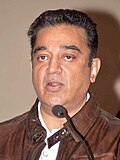| Filmfare Awards South | |
|---|---|
| Current: 70th Filmfare Awards South | |
 | |
| Awarded for | Excellence in the South Indian cinema |
| Country | India |
| Presented by | Filmfare (The Times Group) |
| First award | 17 June 1964 |
| Website | Filmfare Awards |
| Television/radio coverage | |
| Network | Star India (2000–19, 2024) Zee (2022) JioStar (2025–present) |
The Filmfare Awards South are annual awards that honour artistic and technical excellence in the Telugu cinema, Tamil cinema, Malayalam cinema and Kannada cinema. They are presented by Filmfare magazine of The Times Group. When it was introduced in 1954, the Filmfare Awards initially only recognized achievements in the Hindi cinema. In 1964 the awards were extended to Telugu, Tamil, Bengali and Marathi languages for the films released in 1963. [1] The awards were extended to Malayalam cinema in 1967 and Kannada cinema in 1970.
Contents
- History
- Statuette
- The Red Carpet
- Records
- Most Awards for an Individual
- Most Awards for a film
- Most Awards for Best Director
- Most Awards for Best Actor (Popular)
- Most Awards for Best Actress (Popular)
- Most Awards for Best Actor (Critics)
- Most Awards for Best Actress (Critics)
- Most Awards for Best Supporting Actor
- Most Awards for Best Supporting Actress
- Most Awards for Best Music Director
- Most Awards for Best Lyricist
- Most Awards for Best Playback Singer (Male)
- Most Awards for Best Playback Singer (Female)
- Most Awards for Best Cinematographer
- Most Awards for Best Choreographer
- Most Awards for Best Production Designer
- Award Categories
- Creative awards
- Technical awards
- Special awards
- Retired awards
- Ceremonies
- References
- External links
Each industry is given its own set of creative awards in annual ceremonies that have predominantly been held in Chennai and Hyderabad. Before 1976, the ceremony was held in Mumbai along with Hindi segment. From 1976, the southern region segment were separated from awards for Hindi-language films and moved to Chennai first, and later to Hyderabad in 1997. The event made its debut in Bengaluru and Kochi in 2022 and 2026 respectively. [2] [3]

















